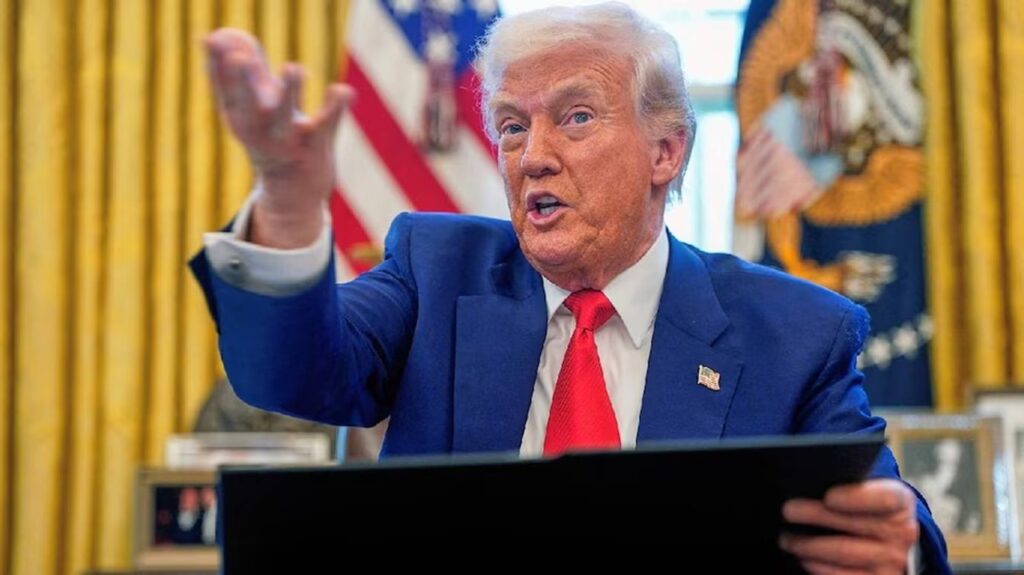New Social Media Vetting Plan Sparks Global Outrage and Threatens U.S. Universities
New Delhi – The Trump administration has issued a sweeping directive to U.S. embassies and consulates worldwide, halting new interviews for student (F), vocational (M), and exchange visitor (J) visas with immediate effect. This move, part of a broader plan to enforce mandatory social media screening for all international student applicants, has sent shockwaves through the global academic community, raising fears of significant delays and economic fallout for U.S. universities.
What Triggered the Visa Interview Ban?
The directive, signed by Secretary of State Marco Rubio, instructs consular sections to pause scheduling new student visa interviews until further guidance is issued, expected in the coming days. According to a Politico report, the policy aims to expand social media vetting to scrutinize applicants’ posts, shares, and comments on platforms like Instagram, X, and TikTok for content deemed threatening to U.S. national security or linked to antisemitism. The move follows executive orders targeting terrorism and campus unrest, particularly pro-Palestinian protests at U.S. universities, which the administration claims have been fueled by foreign students. State Department spokesperson Tammy Bruce defended the policy, stating, “Every sovereign country has the right to vet who enters. This process ensures those coming to America respect our laws and contribute positively.”
Why the Focus on Social Media Screening?
The Trump administration’s push for enhanced vetting stems from concerns over campus activism, particularly protests related to Israel and Gaza. In 2024, the Department of Homeland Security announced it would screen visa applicants for “antisemitic activity” on social media, a policy now being expanded to all student applicants. The administration has already revoked thousands of student visas, with Rubio confirming “probably thousands” have been canceled, often targeting students linked to pro-Palestinian activism. Critics, including the ACLU, argue these actions violate First Amendment rights, citing cases like Rumeysa Ozturk, a Turkish Fulbright scholar whose visa was revoked over a pro-Palestinian essay.
Economic and Academic Fallout
The visa interview ban threatens to disrupt the flow of over 1.1 million international students who contribute $43.8 billion annually to the U.S. economy and support 378,000 jobs, according to NAFSA. Universities, heavily reliant on foreign students’ tuition, face severe financial strain. Fanta Aw, CEO of NAFSA, called the decision “problematic,” arguing it unfairly targets students who make up just 6% of U.S. college enrollment. Harvard University, a focal point of Trump’s ire, has already faced attempts to bar it from enrolling foreign students, with 27% of its student body being international. A federal judge temporarily blocked this move, but the administration’s broader crackdown continues.
Global Reactions and Student Anxiety
The policy has sparked alarm among students from countries like India, China, South Korea, Brazil, and Nigeria, who form a significant portion of U.S. international enrollment. Indian students, numbering over 300,000 in 2023-24, face uncertainty as visa processing times, already lengthy, are expected to grow. Posts on X reflect frustration, with users like
@sahiljoshii lamenting, “America is moving backward,” and
@oneindiaHindi noting increased difficulties for aspiring students. China urged the U.S. to protect its students’ rights, while universities warn of a potential shift toward countries like Canada and Australia.
Targeting Elite Universities
The Trump administration has intensified its campaign against elite institutions like Harvard and Columbia, accusing them of fostering “far-left ideologies” and antisemitism. Recent actions include freezing $2.65 billion in Harvard’s federal grants and canceling $100 million in contracts, moves Trump justifies as necessary to curb “Marxist” influences. Columbia faced similar pressure, implementing stricter protest rules to retain funding. Critics, including Harvard’s president Alan Garber, argue these actions undermine academic freedom and harm national research priorities.
What Lies Ahead?
The visa interview ban and social media vetting plan signal a broader immigration crackdown, with potential travel bans looming for over 40 countries, including student visa restrictions for nations like Cuba, Iran, and North Korea. Experts warn that prolonged uncertainty could erode America’s status as a global education leader, pushing students toward competitors. David Leopold, an immigration attorney, called the policy “cataclysmic” for universities, while Kevin O’Leary, a Trump ally, suggested a balanced vetting approach to retain talent. As students and institutions brace for further guidance, the dream of studying in America hangs in the balance.


